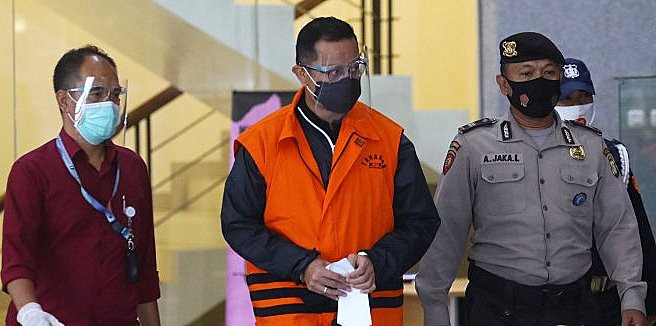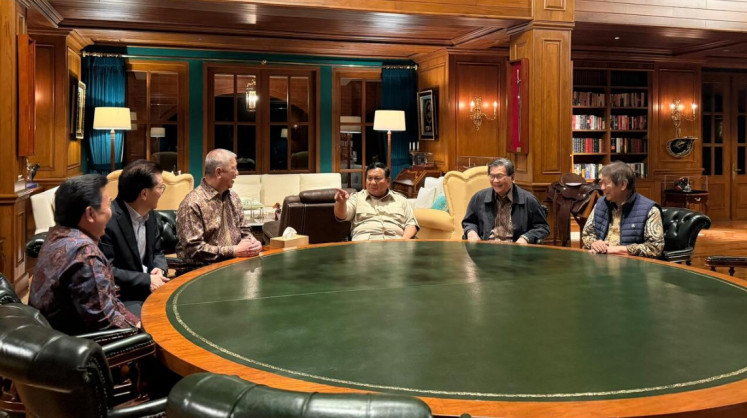Popular Reads
Top Results
Can't find what you're looking for?
View all search resultsPopular Reads
Top Results
Can't find what you're looking for?
View all search resultsHow local wisdom upholds commitment to common good
Appointing ministers, for instance, cannot be only based on political bargaining among party elites, but mostly on objectivity that refers to general will, or in other words, the common good.
Change text size
Gift Premium Articles
to Anyone
“Corruption is a cancer, a cancer that eats away at citizen’s faith in democracy,” Joe Biden, now the incoming United States president, once said. It’s a universal message that we in Indonesia cannot agree with more.
After arresting then-maritime affairs and fisheries minister Edhy Prabowo in a lobster seed export case on Nov. 25, 2020, the Corruption Eradication Commission (KPK) nabbed on Dec. 8, 2020, then-social affairs minister Juliari Peter Batubara for allegedly accepting bribes linked to food aid for those hit by the coronavirus pandemic.
The back-to-back high-profile arrests should embarrass President Joko “Jokowi” Widodo, who had appointed Edhy and Juliari to join the Onward Indonesia Cabinet in October 2019. Jokowi has named Wahyu Sakti Trenggono and Tri Rismaharini to replace Edhy and Juliari, respectively.
Ministers are appointed to execute the vision and mission of the president by strengthening systems of accountability, improving public services, curbing opportunities for corruption and promoting integrity. The ministers can strengthen anticorruption efforts and serve as a check on corruption in the public sector.
The graft cases involving Edhy and Juliari only show a weak, dormant, if not nonexistent, political will to fight corruption. Political will is the reflection of complex circumstances that incorporate the aspirations of individual leaders, a calculation of the benefits and costs that would result from changes in rules and behaviors, and a belief in the ability to muster adequate support to overcome resistance to reforms.
With regard to Indonesian cases, some ministers may not perceive fighting corruption as their being in their best interest.
Even where anticorruption commitments are real, political will can unravel. We should realize that among government officials and politicians, political will usually appears at the beginning of a new administration, but it can wane as opposition to reform solidifies and new opportunities for corruption emerge.
Fatigue, fear, resignation and opportunism may diminish the commitment of reformers and attenuate political will. As a result, anticorruption reforms may break down and corruption may reemerge (Dininio 2005).
Corruption is the most complicated problem that Indonesia is currently facing. Although President Jokowi — for his 2019-2024 vision — underlines the urgency to be open toward investment as he believes it will create jobs, corruption should be still considered a barrier to investment and other development programs.
Fighting corruption is a long-term process. To sustain an effective anticorruption drive, government officials need a political will that incorporates the interests of a wide range of people and is not dependent on the personality and intentions of particular persons or parties.
In the context of Indonesia, even though Cabinet ministers come from different political parties and probably have different points of view on governance, President Jokowi should examine whether all his ministers really perceive corruption as an issue requiring attention or whether an external group (political parties) put pressure on their cadres to commit graft.
This means appointing ministers, for instance, cannot be based only on political bargaining among party elites but mostly on objectivity that refers to general will, or in other words, the common good. In many cases in Indonesia, bargaining often ignores objectivity as well as impacts on governance that relates to public affairs.
The recent corruption cases are enough to prove that the common good in public affairs has been eroded because of subjective interests. On the contrary, the common good can be gained if and only if government officials have political will — which means paying attention to the public for the sake of the public.
Customary people in Lio, East Nusa Tenggara, know how to foster political will. In Lio, the leader of customary people, called mosalaki, lives in sa’o (tribal house).
The mosalaki leads ana kalo fai walu (tribe members) to well-being, giving them land for housing, farming and raising their livestock. The mosalaki is a landowner, but the land can be cultivated by his tribe’s members and even by the members of other tribes. Thus, the mosalaki is a leader not only for his own tribe but all villagers (inhabitants).
During a yearly thanksgiving party, all inhabitants will bring rice, moke (local wine) and chicken to the mosalaki just to thank him for his tenderness. To help him carry out his jobs, the mosalaki can appoint assistants who are publicly known for their competency.
The tribespeople have long been practicing these norms, such as how tribe members behave (customary ethics) and how the mosalaki as a leader shows responsibility for addressing problems facing his tribe members (customary politics).
The local wisdom has been preserved to uphold the common good, quite similar to what Jean Jacques Rousseau prescribed centuries ago.
The high-profile corruption cases serve as a warning to the Jokowi administration to reinvigorate its political will and commitment to the public good; otherwise, the cancer will spread and eat away the nation’s faith in democracy.
***
The writer is a social researcher at the Detukeli Research Center, East Nusa Tenggara.










